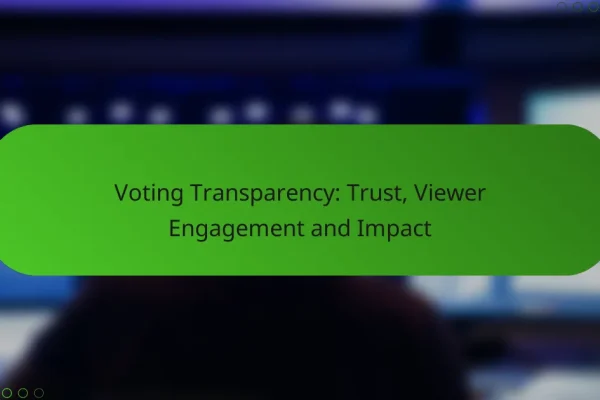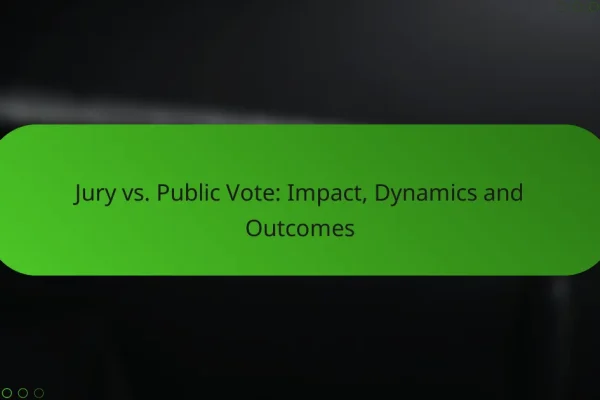How does Eurovision Song Contest voting work?
The Eurovision Song Contest voting process involves both public and jury votes to determine the winner. Each country’s votes contribute to the final score, creating a balanced representation of both popular opinion and expert judgment.
Public voting system
The public voting system allows viewers from participating countries to cast their votes for their favorite performances. This is typically done via phone calls, SMS, or through the official Eurovision app, with each voter allowed to vote multiple times for different acts.
Votes are collected and tallied, with each country awarding points to their top ten favorites, ranging from 1 to 12 points, excluding their own entry. This system encourages fans to support their preferred songs while maintaining a competitive spirit among the contestants.
Jury voting system
The jury voting system consists of professional music industry experts from each participating country who evaluate the performances. Each jury typically comprises five members who assess the songs based on criteria like vocal ability, stage presence, and overall impression.
Similar to public voting, juries award points from 1 to 12 to their top ten entries, which are then combined to form a national score. This expert input aims to provide a more balanced perspective, counteracting potential biases in public voting.
Combined results
The final results of the Eurovision Song Contest are determined by combining both public and jury votes. Each country’s total score is calculated, and the entries are ranked based on their overall points.
This dual system helps to ensure that both popular appeal and artistic merit are recognized, making the competition fairer. The winner is announced during the grand final, with the excitement building as points are revealed in a dramatic fashion, often leading to unexpected outcomes.
What are the voting rules for Eurovision?
The voting rules for the Eurovision Song Contest involve a combination of jury and public votes to determine the winner. Each participating country has specific eligibility criteria, a defined voting process, and a unique scoring system that collectively shape the outcome of the contest.
Eligibility criteria
To participate in the Eurovision Song Contest, countries must be members of the European Broadcasting Union (EBU). Each country selects its representative through national selection processes, which can vary significantly in format and criteria.
Artists must perform an original song that has not been released prior to a specified date. Additionally, there are age restrictions for performers, typically requiring them to be at least 16 years old on the day of the contest.
Voting process
The voting process consists of two main components: professional juries and public votes. Each participating country awards points to their favorite songs, with both juries and the public contributing to the final score.
During the live show, viewers can vote via phone, SMS, or through the official Eurovision app. Votes are collected and tallied, with each country revealing their points in a televised segment, enhancing the suspense of the results.
Scoring system
The scoring system allocates points from 1 to 12, excluding 11, to the top ten songs as determined by both the jury and public votes. The final score for each entry is the sum of points from both voting groups.
This dual scoring approach ensures a balanced representation of both expert opinions and public preferences, making the contest more engaging. The overall winner is the entry with the highest total points, while the detailed breakdown of scores adds transparency to the results.
How can viewers participate in Eurovision voting?
Viewers can participate in Eurovision voting through various methods, allowing them to support their favorite performances. The voting process typically includes online voting and phone voting, with specific guidelines that vary by country.
Online voting methods
Online voting for the Eurovision Song Contest is available through the official Eurovision app and website. Viewers can cast their votes by creating an account and selecting their preferred entries during the voting window, which usually opens after all performances have concluded.
Each voter can typically submit a limited number of votes, often ranging from 5 to 10 entries. It’s essential to ensure your internet connection is stable to avoid issues while voting.
Phone voting options
Phone voting allows viewers to call designated numbers to cast their votes for their favorite acts. Each participating country has specific phone numbers for voting, and calls may incur standard rates or additional charges depending on the provider.
Voters should be aware that phone lines may be busy during peak voting times, so it’s advisable to call early. Additionally, some countries may limit the number of votes per person to ensure fairness.
Regional restrictions
Regional restrictions apply to Eurovision voting, meaning that only viewers in participating countries can vote for their entries. Each country has its own rules regarding who can vote, often limited to residents or citizens.
It’s crucial to check the specific voting regulations for your country, as some may require viewers to be of a certain age or to register in advance. Additionally, viewers outside their home country may not be able to vote for their national entry, depending on the rules set by the contest organizers.
What are the historical voting trends in Eurovision?
Historical voting trends in the Eurovision Song Contest reveal patterns in how countries award points to their favorite entries. Over the years, certain nations have consistently received higher votes, influenced by cultural ties, geographical proximity, and political relationships.
Top countries by votes
Countries like Sweden, Ireland, and the United Kingdom have historically been among the top recipients of votes in the Eurovision Song Contest. Sweden, for instance, has won multiple times and often ranks high due to its strong pop music tradition and well-produced entries.
In contrast, nations such as Greece and Turkey have also garnered significant support, often benefiting from diaspora voting, where expatriates support their home country’s entries. This trend highlights the importance of cultural connections in the voting process.
Voting patterns over the years
Voting patterns in Eurovision have evolved, especially with the introduction of the public voting system alongside jury votes. This dual approach has shifted the dynamics, allowing for a more diverse range of winners and altering how countries strategize their entries.
Additionally, regional voting blocs have emerged, where neighboring countries tend to vote for each other, creating predictable patterns. For example, the Nordic countries often support one another, which can significantly impact the final scores and overall results.
How has technology impacted Eurovision voting?
Technology has significantly transformed Eurovision voting by introducing digital platforms that enhance accessibility and engagement. This shift allows viewers to participate in real-time, making the voting process more interactive and immediate.
Use of apps for voting
Voting apps have become a primary method for Eurovision fans to cast their votes. These applications enable users to vote for their favorite performances directly from their smartphones, streamlining the process and increasing participation. In many countries, the apps are available for both iOS and Android devices, ensuring broad accessibility.
To vote, users typically need to download the official Eurovision app, create an account, and follow the prompts during the live show. It’s important to note that voting windows are often limited to a few minutes after the performances, so users should be prepared to act quickly.
Real-time results tracking
Real-time results tracking has added a new layer of excitement to Eurovision voting. Fans can now follow the unfolding results as they happen, providing immediate feedback on how their votes impact the competition. This feature enhances viewer engagement and creates a more dynamic viewing experience.
Many platforms display live leaderboards, showing which countries are leading in votes. However, viewers should be aware that these results can change rapidly, especially in the final moments of voting. Keeping an eye on the leaderboard can help fans gauge the competition and adjust their voting strategies accordingly.
What are the controversies surrounding Eurovision voting?
Eurovision voting has faced various controversies, primarily centered around allegations of political bias and disputed results. These issues can affect the perceived integrity of the competition and influence public opinion on the event.
Political voting allegations
Many critics argue that Eurovision voting is influenced by political relationships among participating countries. For instance, neighboring nations often vote for each other, leading to claims that votes reflect alliances rather than musical merit.
This phenomenon can skew results, making it difficult to determine which entries are genuinely the most popular. Observers note that countries with historical or cultural ties frequently award high points to one another, which can overshadow deserving performances from less connected nations.
Disputed results
Disputed results in Eurovision can arise from various factors, including voting irregularities or discrepancies in the tallying process. Occasionally, countries may contest the validity of votes, claiming that they were miscounted or influenced by external factors.
Such disputes can lead to significant public outcry and calls for transparency in the voting process. In some instances, the European Broadcasting Union has had to intervene, reviewing the votes and making adjustments to ensure fairness and accuracy in the final results.












